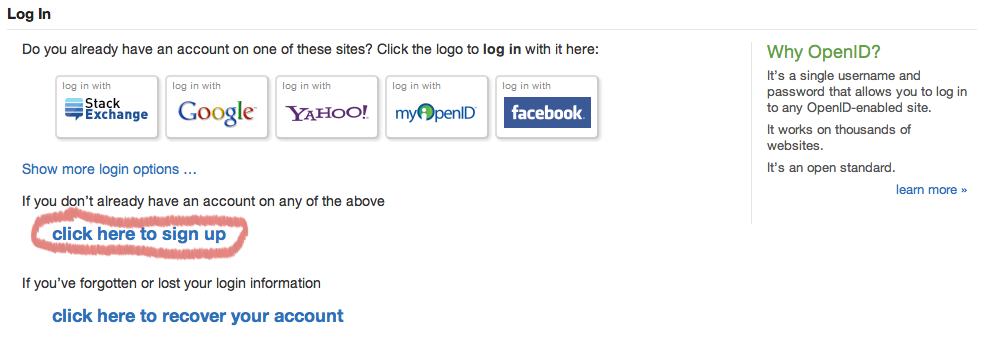The cookies for subdomain, 'openid.stackexchange.com' are not, as claimed, actually removed from the browser upon logging out of stackexchange.com, but they should be.
Applies to: * stackexchange.com, date: January 8, 2012
Desired result:
- Upon logging out of Stack Exchange, Stack Exchange OpenID local credentials stored 'in your browser' (or stored anywhere on the user's computer) should actually be deleted, as promised. For example, Stack Exchange OpenID browser cookies actually should be deleted.
- Logging in again should require explicitly entering one's credentials again. This might be email address and password.
- It is misleading to claim that (all relevant) 'local credentials in your browser' are deleted, since anyone else sitting down at the same computer can merely click the login links and immediately be accepted as the same, previous user! (See procedure to duplicate, below.)
Procedure to duplicate the problem in FireFox:
Versions (Menu-Help-Troubleshooting Information-Application Basics-User Agent): * Mozilla/5.0 (Windows NT 5.1; rv:9.0.1) Gecko/20100101 Firefox/9.0.1
- Start FireFox.
- In Firefox's cookies manager (Menu-Tools-Options-Privacy), click the button, 'Exceptions', enter stackexchange.com and stackoverflow.com, and each time, click the button, 'Allow for Session'.
- Click the button, 'Close'.
- Click the button, 'Show Cookies'. Type, 'Stack', select stackexchange.com and stackoverflow.com if they are there, and each time, click the button, 'Remove Cookies'.
Close Firefox.
Start Firefox.
- Close webmail notifier windows.
- Log out of Gmail.
- Wait ten seconds.
Click the back button on the browser to make sure one is not still logged in to Gmail.
Open a tab for, https://stackexchange.com/ .
- In NoScript, if you have it, allow the domains, 'stackexchange.com' and, 'sstatic.net' and refresh.
- Click the link at the top, 'login'.
- On the resulting page, click the box, 'Log in with Stack Exchange.'
- Enter one's Gmail email address and Stack Exchange password, which results in a successful Stack Exchange login.
- Click the link at the top, 'logout'.
- The resulting web page has an orange button labeled, 'logout', above which is presented the text, 'Clicking Log Out will clear all local credentials in your browser.'
- Click the orange button labeled, 'logout'.
One might think that one has completely logged out safely from Stack Exchange, with no possibility of simply clicking back in. But, not true!
- Now the page has the link at the top, 'login'.
- However, the Firefox Cookie Manager still shows cookies under domains, 'stackexchange.com' and 'openid.stackexchange.com'.
- Click the link at the top, 'login'.
- On the resulting page, again click the box, 'Log in with Stack Exchange.'
- See the login unexpectedly succeed, without entering any email address or Stack Exchange password!



openid.stackexchange.comwhich is it's own distinct provider (which you can use on other sites, not just ours), only the Q&A sites. IMO, the logout button on our sites shouldn't introduce odd re-enter-credentials behavior on other sites you used our provider with.http://stackexchange.com/is something very different than logging out from the OpenID provider athttp://openid.stackexchange.com/. You need to log out of your Stack Exchange OpenID, otherwise yes, the OpenID provider can still authenticate you.